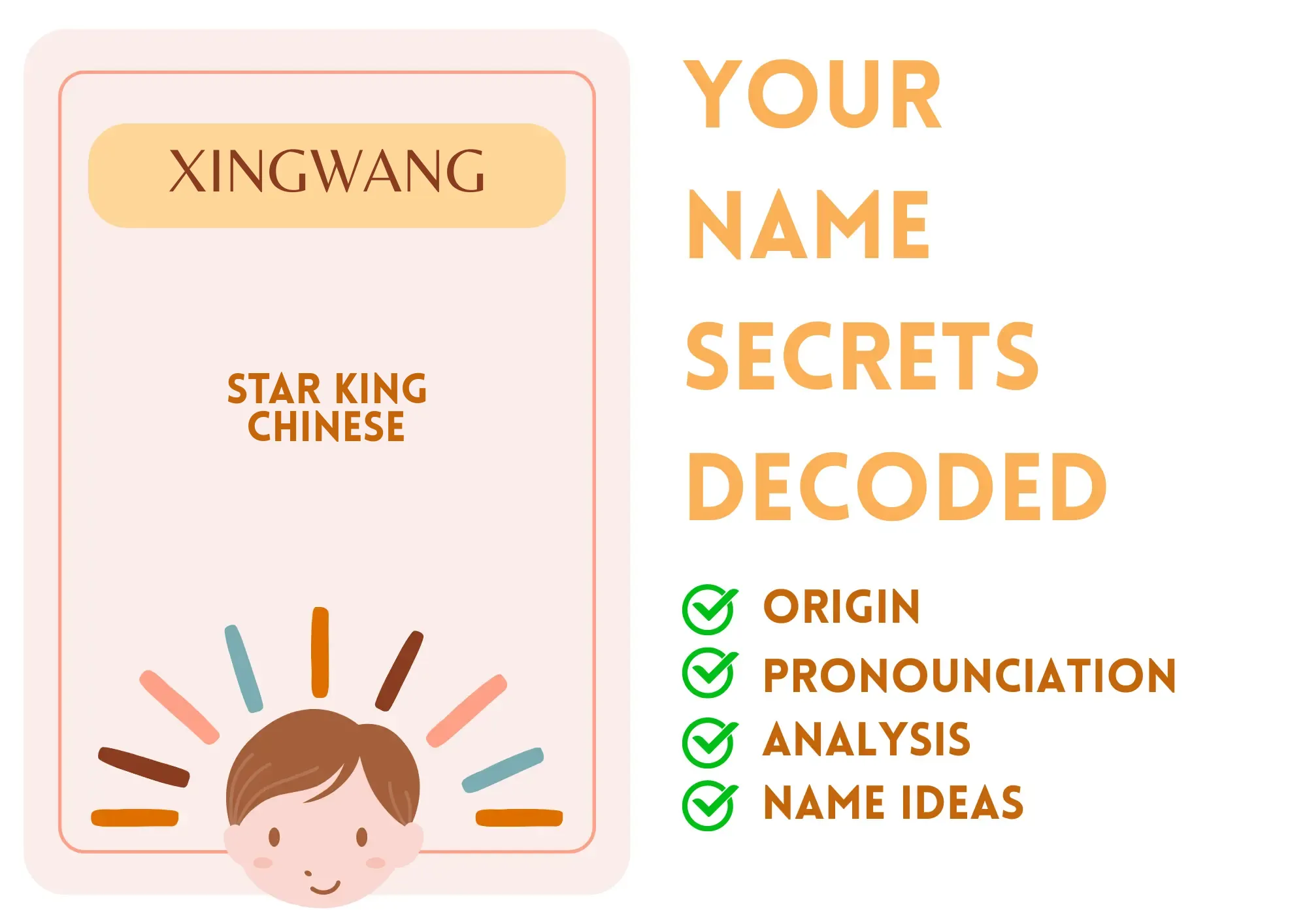
Xingwang
Xingwang is a name of Chinese origin that translates to 'star king' or 'king of stars.' It embodies notions of brightness, nobility, and aspirations towards greatness. Traditionally, it is predominantly used as a masculine name but can also be adapted for unisex use. In Chinese culture, naming a child Xingwang reflects hopes for them to shine brightly in life, achieving high status and recognition.
The name Xingwang carries a deeply positive connotation, evoking feelings of warmth, inspiration, and prestige. It is relatively easy to write and pronounce in both Chinese and English contexts, although its pronunciation can be challenging for non-native speakers. Common nicknames include Xing and Wang.
Xingwang is not widely present in Western popular culture, though it may appear in Chinese films or literature where characters symbolize perseverance or brilliance as leaders. Overall, Xingwang is a unique choice with profound cultural roots, resonating positively with those familiar with its meaning and significance.
Basic Information
Gender: Boy
Sounds Like: SHING-wahng
Pronunciation Explanation: The first syllable 'SHING' rhymes with 'sing' and is pronounced with a soft 'sh' sound. The second syllable 'wahng' has a nasal 'ng' sound at the end.
Summary and Meaning
Meaning: star king (Chinese)
Origin: Xingwang has Chinese origins, rooted in the Mandarin language where it is composed of 'xing' meaning 'star' and 'wang' meaning 'king.'
Usage: Xingwang is traditionally a masculine name, although it can be used as a unisex name in modern contexts.
Name Number (Chaldean)
Name Number (Pythagorean)
Popularity (Global Rank)
Overall: 357805
Boys: 72681
Most Popular in
Religious and Cultural Significance
Religion: Buddhism
Background: In Chinese culture, the concept of a king, especially a star king, can relate to Buddhist ideals of leadership, wisdom, and spiritual enlightenment.
Cultural Significance: Xingwang is culturally significant in China as it reflects the virtues of aspiration and excellence, associated with successful leaders or individuals who make impactful contributions to society.
Historical Significance: Historically, names with royal connotations, such as Xingwang, have been linked to dynastic leadership and the cultural significance of celestial bodies, viewed as omens or symbols of greatness in ancient Chinese culture.
Popular Culture
Literature and Mythology: While Xingwang may not be prevalent in global literature, variations of the name appear in Chinese stories representing leaders or celestial figures.
Movies and Television: Chinese films or TV shows may feature characters named Xingwang, often symbolizing nobility or inspirational leaders aiming for greatness.
Feelings and Perceptions
Perception: Xingwang is viewed positively within Chinese cultural contexts, symbolizing brightness and accomplishments. In international circles, it may carry connotations of uniqueness and creativity.
Positive Feelings: Inspires hope, bright, noble, aspirational, unique.
Negative Feelings: Might be difficult for non-native speakers to pronounce, leading to potential misinterpretation.
Practical Considerations
Ease of Writing and Calling: Xingwang is moderately straightforward to write in English, though some may find the pronunciation challenging. It consists of two syllables, making it manageable verbally.
Common Typos and Misspellings: Xingwong,Singwang,Xingwan,Singwong
Common Nicknames: Xing,Wang,Wangy
Xingwang Popularity
Xingwang Usage and Popularity By Country
| Country | Rank (Overall) |
|---|---|
| Singapore | 53638 |
| Canada | 96992 |
| United States | 116528 |
| United Kingdom | 182431 |
Xingwang Usage and Popularity By City
| City | Rank (Overall) |
|---|---|
| Peking | 4505 |
| Shanghai | 8799 |
| New York | 52406 |
Compatibility Analysis
Famous Persons Named Xingwang
No results found for Xingwang.
Related Names
Similar Sounding Names:
Xing,Wang,Xinyao,Xian